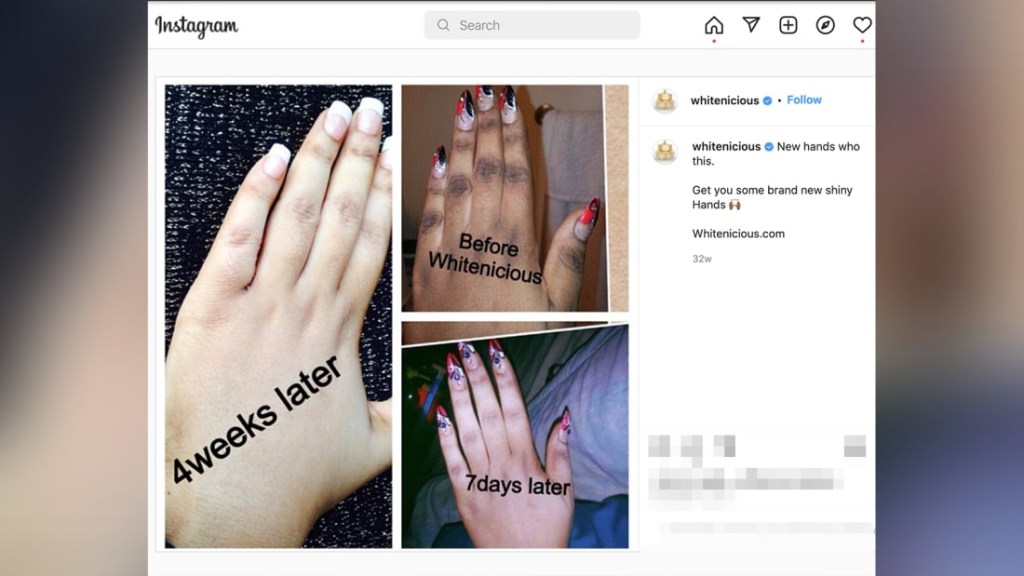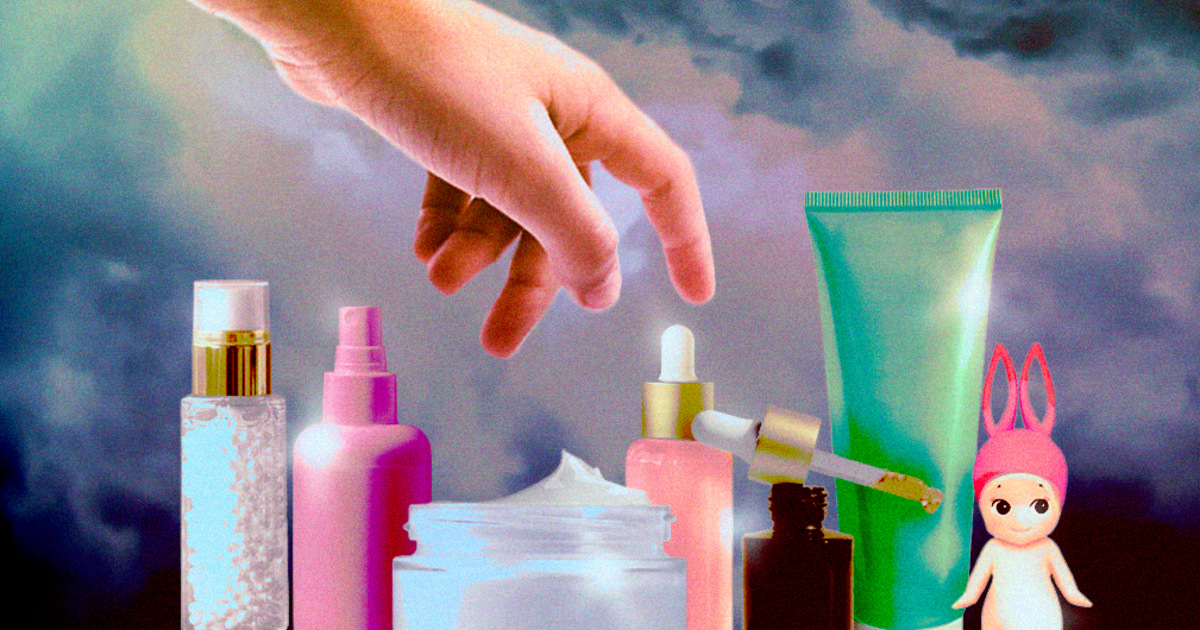Editor's Note:
This story is part of "White Lies," a CNN As Equals series that investigates skin-whitening practices around the world to expose the underlying factors of colorism, the industry that profits from it, and the cost to individuals and communities.
For information on how CNN As Equals is funded and more, check out our FAQs.
(CNN) --
Skin-lightening products, once sold primarily in grocery stores and beauty shops, have exploded in online availability and are now ubiquitous on all major social platforms.
On Facebook and Instagram, marketers tout creams and serums that promise clearer skin but offer little information about the products themselves, while YouTube and TikTok have thousands of tutorials from people promoting powerful products or home remedies without Nothing to support your claims.
On TikTok alone, the hashtag #skinwhitening has over 254 million views, while #skinlightening has another 62 million.
"Social media has become the most powerful tool right now for selling skin lightening products," says Dr. Anita Benson, a Nigeria-based dermatologist and founder of the Embrace Melanin initiative to combat colorism and harmful practices. of skin lightening in Africa.
Over the years, Benson has treated many people with skin problems following the use and misuse of skin whitening products, including many women who have bought them on social media.
She worries that social media platforms help perpetuate colourist ideals - the belief that lighter skin is associated with beauty, success and often wealth as well - and now also provide a market for that the products act according to these ideals.
Everything you need to know to fight sunburn, premature aging and skin cancer this summer
Previous research on other media shows a strong influence on colorism, explained Amanda Raffoul, a postdoctoral researcher at Harvard's public health incubator STRIPED, who is studying how these products are promoted on TikTok.
"But little is known about how (skin lightening) products are promoted on social media," she told CNN.
advertising
Although the broader impact remains to be seen, experts like Benson are alarmed by what they are witnessing firsthand.
Benson points to last year's #glowupchallenge, a hashtag with more than 4 billion views on TikTok, as an example where users compared before and after pictures of themselves.
Many of the posts Benson saw featured people with lighter skin, and he believes these types of appearance-based viral challenges have made lightening (whitening) products "more popular and more acceptable."
power of influence
Social media influencers have also made the practice, and the products, more acceptable as many are paid to advertise skin-lightening cosmetics, pills and injections, although some may be pressured to do so, as reported by BuzzFeedNews in 2020.
For example, one of the top live streamers on the Chinese platform Douyin, Li Jiaqi, has promoted skin lightening to his 44.8 million followers, while another popular streamer, Luo Wangyu, has advised his 19, 4 million followers that "to achieve whiter skin, you need to both whiten your skin and get rid of the yellow."
Nigerian influencer Okuneye Idris Olanrewaju, known as Bobrisky, promotes an aspirational lifestyle using Lagos-based skin-lightening brands for her 4.5 million Instagram followers and 1 million Snapchat followers.
Back in 2018, American reality star Blac Chyna, who has more than 16 million followers on Instagram, faced backlash when she announced that she would be collaborating with the Whitenicious brand on a lightening cream.
Although that post was deleted, the celebrity has maintained a partnership with the company and the Whitenicious x Blac Chyna collection continues to sell a range of "brightening" products while the company promotes skin lightening more widely on its Instagram account.
An Instagram post announcing a skin whitening process.
CNN has withheld part of this image to protect the privacy of unrelated parties.
Credit: From Instagram
Whitenicious founder, singer Dencia, has previously defended her products, saying they don't contain harmful whitening ingredients like mercury, hydroquinone, or steroids, which are found in many other lightening products.
None of the named influencers or brands responded to CNN's request for comment.
Exclusive: Skin-whitening creams with high levels of mercury are still sold in major online stores, study finds
A global market that is easy to create and difficult to control
Experts caution that smaller sellers, in particular, are likely to have fewer measures in place to ensure the products they sell on social media are safe.
It's easy to create a shop on Facebook or Instagram, post an ad on the Marketplace, or simply ask interested users to send a message to transact.
Many products advertised as skin whiteners and lighteners contain mercury, hydroquinone, or corticosteroids, which are potentially toxic and can affect human health.
A quick search on Facebook, Instagram, TikTok, and YouTube brings up numerous posts, and sometimes entire business pages, selling or promoting the use of products that have been flagged by researchers at the Minnesota Department of Health, or by the Zero Mercury Working Group (ZMWG) for containing high levels of mercury.
Mercury can have multiple negative health consequences, including neurological and cardiovascular damage.
CNN shared a sample of these posts with each social media platform.
YouTube and TikTok said they did not violate their community guidelines, although TikTok removed them after CNN asked more questions about the US Food and Drug Administration's (FDA) regulations on the Mercury in cosmetics.
A TikTok spokesperson said then that the company is still working to better detect such content, including working with outside industry experts to identify unsafe products, but other videos of mercury-containing products remain on the platform.
Meta, the parent company of Facebook and Instagram, did not comment on the posts shared with CNN, but said they devote "substantial resources" to ensuring that unsafe or illegal items are not sold on their platforms.
little accountability
Benson, the Nigeria-based dermatologist, is particularly concerned about the number of home products she sees for sale on these platforms.
"Skin product vendors ... don't need a store," he said.
They also do not "need FDA approval or NAFDAC registration," referring to the Nigerian National Food and Drug Administration and Control Agency.
"They don't even need to write the contents of the creams on the jar. They just tell their followers that it's a secret recipe."
Benson explains that he has had patients come in saying they have been using "all-natural" whitening creams but have the "tell-signs" of stretch marks associated with steroid use.
"Somebody hasn't been honest," says Benson, and what worries him is that it's the vendors who are selling them, who don't seem to be accountable to anyone.
When his patients complain, vendors block them, he said.
Steroids can cause a number of side effects, including rashes and stretch marks, when used for long periods without medical supervision.
Another dermatologist, Texas-based Dr. Adeline Kikam, expressed the same concerns as Benson.
"I see it all the time in my practice: people create their own concoctions," he told CNN, acknowledging that this is difficult to control and regulate.
"When there are so many small companies doing it globally and putting it directly on social media, I think it's even more difficult," she said.
"Platforms really need to focus on misleading claims about what some of these products [can] do to skin."
Millions of Interactions:
CNN identified and analyzed thousands of social media posts that contained hashtags related to skin whitening, such as #skinwhitening, #skinlightening, #skinwhiteningtreatment and #whiteningcream.
Data from CrowdTangle, an insights tool owned and operated by Meta, shows that between May 31, 2021 and May 31, 2022, almost 80,000 posts were generated on Facebook pages and public groups, receiving more than 2 million social interactions (comments, shares and reactions). On Instagram, at least 20,900 posts discussed the use of skin-whitening products during the same time period, receiving nearly 6.5 million interactions.
Given the reach of Meta, and the fact that CrowdTangle only tracks public content—the results don't show posts from closed groups or personal profiles—it's likely that these numbers reflect only a portion of a much larger audience.
Christine Wanjiku Mwangi, from Kenya, who sells whitening products under the accounts Shix Beauty on YouTube and Shixglow Skincare on Instagram, originally purchased acne beauty products through Facebook, which also had the effect of lightening her skin tone.
Happy with the results, she started her own skincare brand, and social media platforms have been crucial to her own business.
"Ninety percent of my customers find me through YouTube or Instagram, but mostly Instagram," she said, adding that she plans to expand to TikTok as well.
PHOTOS |
Get to know the medical illustrations in dark skins by Chidiebere Ibe
Speaking to CNN, he believes his products are safe and effective, and says he disagrees with "not legitimate" online sellers who take advantage of their customers.
"Those who rip people off by posting fake before and after photos, fake reviews, etc. and taking people's money and selling them products that don't work," she explained.
Mwangi said it uses ingredients such as alpha arbutin, glutathione, kojic acid and niacinamide in its skin-lightening face, lip and body products, and offers ingredient lists and directions for use on its website, as well as a FAQ page and contact information for any questions.
She did not respond to CNN when asked if his products are certified by the Kenya Bureau of Standards, nor did she provide detailed information on how his ingredients are tested, but said she uses third-party quality assurance agencies.
CNN reached out to several vendors via social media platforms for information on their markets, but only Mwangi commented.
Repeated failures in law enforcement
Katie Paul, director of the Tech Transparency Project, which has tracked the circulation of content harmful to young people on social media, believes that many of the major tech companies are not adequately enforcing the policies they have in place.
For example, when it comes to paid advertising, Meta and TikTok have additional rules.
A TikTok spokesperson explained that ads for skin whitening products are not allowed on TikTok in the US or UK, although spot-fading treatments are.
Facebook's advertising policies explicitly prohibit content that "implies or attempts to create a negative self-perception for the purpose of promoting diet, weight loss, or other health-related products."
And while its policies don't mention weight-loss products, it limits ads for both supplements and cosmetic procedures to people 18 and older.
Facebook and Google Fund Disinformation, According to MIT Technology Review Research
As evidence, the Tech Transparency Project posted an ad on Facebook that purported to intentionally violate Meta's policies, scheduling it for a future time so they could cancel it before it reached any users.
The ad for the fictitious "Max White Lightening Gel", aimed at adolescent females ages 13-17, featured a darker-skinned woman applying a cream with the slogan "Unlock your beauty potential!"
Paul's ad was approved in less than an hour.
A test ad from the Tech Transparency Project that purported to intentionally violate Meta policies was approved by Facebook.
Credit: Tech Transparency Project
"We've seen repeated failures to enforce policies, and particularly in areas that are for profit, such as approving harmful ads, or continuing to allow the sale of questionable or harmful content in Facebook Shops," he said.
Meta did not respond to CNN's request for comment on whether the ad in question violated its standards.
Experts have made it clear that policy enforcement is badly needed, as is more effective protection of young users, careful oversight of product listings, and greater transparency about how user-generated content is moderated and of payment.
They also believe that there should be more responsibility when the products sold on these platforms are harmful to the consumer.
Tech companies have largely maintained that they are not responsible for the products sold through their platforms, but lawmakers in Europe and the US want to offer consumers more protection and legal recourse.
Earlier this year, the European Union agreed on the regulations of the Digital Services Law and the Digital Markets Law, which introduce a framework to regulate technology companies operating in Europe.
The new rules will come into force in 2024.
In March, the California Court of Appeals ruled that Amazon must warn California consumers about products on its website that contain harmful toxins, such as mercury, marking the first such ruling.
Both Democratic and Republican US lawmakers have sought to amend Section 230 of the Communications Decency Act, which broadly protects tech platforms from user content lawsuits.
If they manage to update it, it would have important implications.
Are social networks similar to railways?
The future of Facebook and Twitter could depend on the answer to this question
Google also announced that it will restrict ads for skin-lightening products "that imply the superiority of one skin tone over another" starting in June.
Harvard researcher Raffoul said her STRIPED team will begin a study this summer to explore whether Google actually enforces this policy.
As for social media companies, they have already made efforts in the past to regulate content that is considered harmful to users, such as hate speech, nudity and eating disorders.
Raffoul now hopes that they will be held accountable for the vast amount of unregulated content on skin lightening, beyond paid advertisements.
"The fact that the content is generated by users does not mean that the responsibility for regulating it should fall on them."





/cloudfront-eu-central-1.images.arcpublishing.com/prisa/FPECVW63TVFWNJJWMZCKKQSIOA.jpg)


